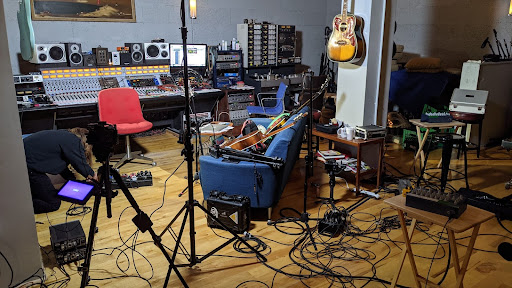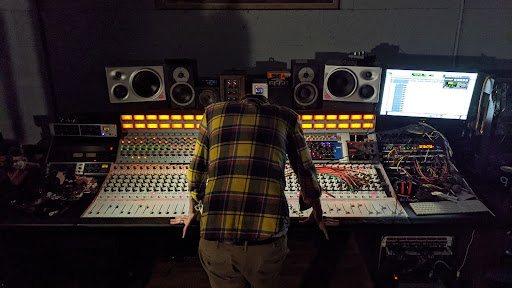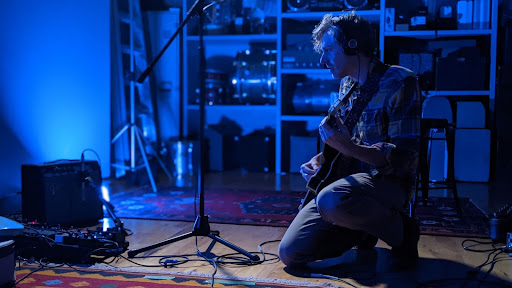Digging into the creative process, Byta speaks with artists, musicians, producers, DJs and anyone involved with music creation. A conversation about how they create, collaborate and share music. From studio setups to routines, and the first person to hear about the next 'big' work.
Hey, Joel Plaskett, where are you based?
Dartmouth, Nova Scotia.
How, when and where did you start making music? Are you primarily a musician or a producer, or do something else?
I started playing in a band when I was 14 years old. We called ourselves Nabisco Fonzie for 6 months. After that we changed our name to The Hoods and played our junior high talent show and school dance. By the time we were in High School we were called Thrush Hermit and started playing local gigs downtown. We were lucky enough to be one of the younger bands around during the early mid-1990s when Halifax became a play of focus. Bands like Sloan, Eric’s Trip, Jale and Hardship Post were getting a lot of attention. We signed a developmental publishing deal with BMG in New York in 1993 before I had finished high school. Then a record deal with Elektra in 1996 and then we disbanded in 1999.
In the last year of the Hermit, I formed another band called The Joel Plaskett Emergency. I played songs from a solo record I made called In Need of Medical Attention. It started as a five-piece band with Charles Austin, Tracy Stevens, Andrew Glencross and Dave Marsh on drums. In early 2000, after the Hermit disbanded it scaled down to a three-piece. Dave Marsh was on drums and Tim Brennan on bass. I continued making music with the Emergency (Chris Pennell now on bass). Plus I was going out on my own, with others and also with my father, Bill. I got more involved in producing my records. By 2005 started working as a producer for other artists as well.
Who would you consider some of your biggest influences when it comes to your “sound”?
I’ve always been influenced heavily by artists and bands I have known. My former Hermit bandmate, Rob Benvie, is a unique lyricist and his writing influenced mine. Our bass player Ian McGettigan is excellent with sound and spontaneous production ideas. He has influenced my sensibility in the studio.
Other local influences that come to mind are Sloan, Al Tuck, Matthew Grimson and Dave Marsh (who plays the drums in the Emergency). Also other artists I have worked and played with over the years. Folks like Mo Kenney, Charles Austin, Rose Cousins, Ana Egge, Peter Elkas, Two Hours Traffic, Dennis Ellsworth.
When I’m in the production chair I learn a lot from the artists I’m working with. When Gordie Johnson (from Big Sugar) produced a record for the Emergency I learned a lot from him. Specifically on the sonic and arrangement front. My wife, Rebecca Kraatz, is a visual artist and her unique aesthetic and taste have influenced me deeply.
As far as classic influences from elsewhere – Led Zeppelin are on the top shelf. Nick Lowe, Joni Mitchell, Bruce Springsteen, Irma Thomas, Curtis Mayfield, Jim Ford, Gillian Welch, Husker Du and Those Bastard Souls come to mind.
I’m sure I’ve borrowed more than I realise from everyone I’ve mentioned. Though, it may be easier for others to recognize those nods before I do. My hope is that now and then I’m able to juxtapose and counterpoint my influences with something unusual or new. All those little things you learn eventually turn into your “sound”. That said, I like flirting with different musical styles on the production front. I think it can be my lyrical perspective that holds things together under one roof.
Explain your creative process. Do you have a routine?
I wish I had more routine when it comes to writing but it just comes and goes. Full moons seem to be productive lately. I get a lot of ideas in the shower or bath or when I’m walking or driving. Basically, when I can’t have the phone or a book in my hand my wandering mind starts creating something. Sometimes it’s a lyric, a melody or a rhythmic idea. Occasionally I pick up a guitar and the first thing I play turns into something. I have about 1000 voice memos of unused ideas. I organise and name them now and then, then revisit them when I’m looking for something to work on.
What is your “studio” setup?
I have a studio called Fang Recording. It is a commercial space run by our great engineer, Thomas Stajcer. I’m very fortunate to have access to the space when it’s not being booked by other artists. We are equipped with tape machines and well a computer set up. I love the sound of analog recording so everything I record hits magnetic tape first, using a system called CLASP than allows us to sync the tape machine to Pro Tools. We have an excellent Rupert Neve 5088 console that we track and mix through. The tech at RND told us based on the serial number that it was originally owned by Usher.
I’m useless when it comes to computers and I like to focus on music more than sound so essentially I almost always track with an engineer on board to operate the gear. That said, I love mixing on an analog desk and am very involved with my mixes. Moving faders during the mix, doing little reverb throws etc. As far as gear goes, I really like our Studer tape machines (2”, ½” and ¼”), the console, the two EMT plate reverbs and the collection of old guitars and drums that make it on the records.
While you can emulate many sounds with computers and plug-ins, I far prefer tactile analog equipment and instruments. I like recordings that sound like the instruments they were made on in the room they were played in. The only downside is much of this gear requires a lot of maintenance and space.


What is your process when working with other people? How is collaboration different in the studio vs working remotely?
Much of the work I do is in the studio with people. I recently produced a record for a great act from Toronto called Sister Swire. The first three singles are out now. Occasionally folks send me tracks to add stuff to or things to mix for them remotely. I mixed records for Boy Golden from Winnipeg, Marian from Fredericton and Graven from Ottawa over the last couple of years. Every artist is different and while I have an approach I often take, it really depends on the musician, their temperament and their budget for time.
At what point(s) are you comfortable letting other people hear what you are working on?
I play stuff for friends when I’m working on it at the studio now and then. Occasionally I send demos to other songwriters I know for feedback on whether the tune is connecting the dots. I tend not to share much with others, particularly on the business/label side, until it’s all mixed and mastered to my satisfaction. People only get that first listening experience once so I like to put my best foot forward, while at the same time sending the message, “Ok here it is, it’s done and I’m happy with it.”
Do you share your work in progress (streams or downloads)? Any technical frustrations?
We are mostly using Dropbox. Works decently although I wish there was a way on one’s iPhone to add a mix or track from Dropbox to the iTunes music library directly. I am pretty lazy and uninterested when it comes to technology and the organisation of things digitally so if I have too many options I get overwhelmed. One thing I know is I hate getting stuff on Google Drive and trying to listen on my phone. Anything that requires memorising more passwords and signing in is a pain.
How do you know when a track/album is finished?
I’m not sure it ever is. While chasing the “definitive” version of a song was something I pursued more when I was younger, recently I’m of the mindset that if you can find a version of the song that feels great that day, and it still feels effective a week later, then you are probably on to something. The songs morph once they go out into the world and I’m prolific enough that I’d rather keep songs moving through my world rather than overwork them.
That said, there are times when a song feels catchy enough that I want to go the distance to capture it in a way that could reach people more directly. If I’m producing other artists I’m game to chase a big polished arrangement when the song really calls for it but it depends on what the artist wants to achieve and how much time they have to commit.
How do you listen to the final mixes/mastered work?
I listen to my final mixes in the studio and often when I get mastered audio (usually from J Lapointe at Archive Mastering) I just listen on headphones or in the car.
How important is pre-release security when sharing new work?
Personally, I’m not hugely concerned about it as usually what I’m working on is only shared with a few people who I know won’t fly it onto the internet before it’s released.
Who on your team gets to hear the final versions first and why, what formats do they each need?
I often share final mastered versions with my bandmates or other folks who played on the recordings, a few musician friends I like to bounce things off and my manager, Sheri. I’ll sometimes send mp3s to folks who I know will only listen on their phone through the crappy speakers but tend to send WAVs mostly. Kim Cooke released my last number of records on the Pheromone label (which he recently sold). He’s been a great supporter and in my corner since he brought me to MapleMusic in the mid-2000s. He’s got great ears and has a part in Revolution Recording in Toronto.
Outside of your inner circle who are the people that will need to hear the new tracks next?
We often generate SoundCloud private links for streaming but I don’t know how to do that and leave it to my team to sort. Sheri will often take the recordings to the label and publicity folks once it’s ready to hatch but I leave it to her to sort how that is being delivered. That said, I’m always suggesting WAV file listens before MP3s.
Anything you are working on, anyone you are working with and want to share?
I’m back on the road playing shows with some this summer and a full national Canadian tour in September/October. Check my site for details.
I’ve also been collaborating with folks at the studio and making some of those sessions exclusive for my Patreon subscribers. Here’s a link to a unique, improvisational session with the great piano player, Bill Stevenson.
And here’s another link to a collaboration with my friend, Erin Costelo, a stellar singer, songwriter and producer.
I’m also writing some new music but not in a big rush as my last quadruple record, 44 was an adult portion.


